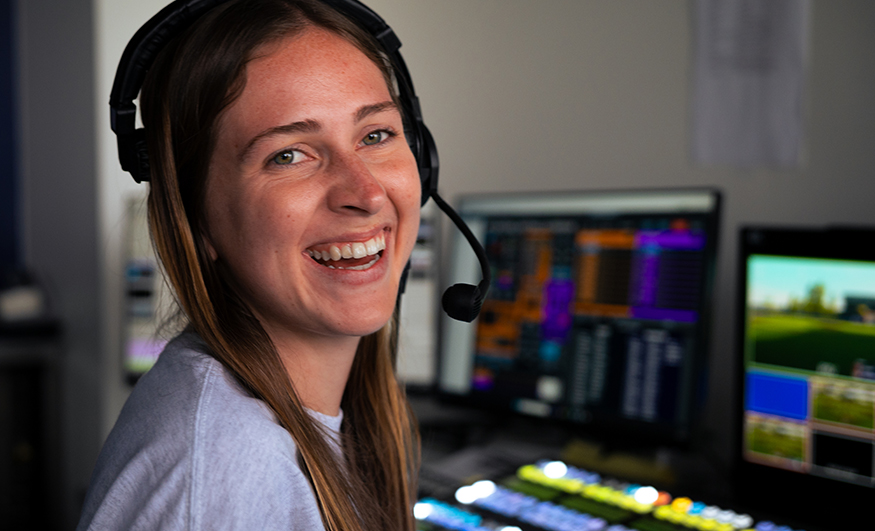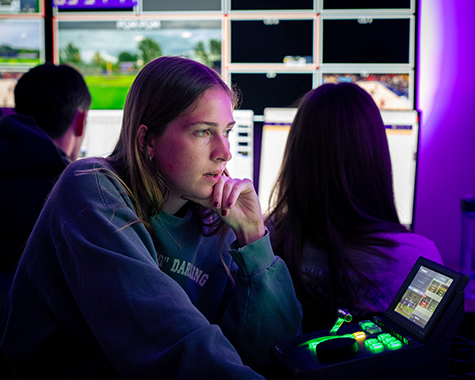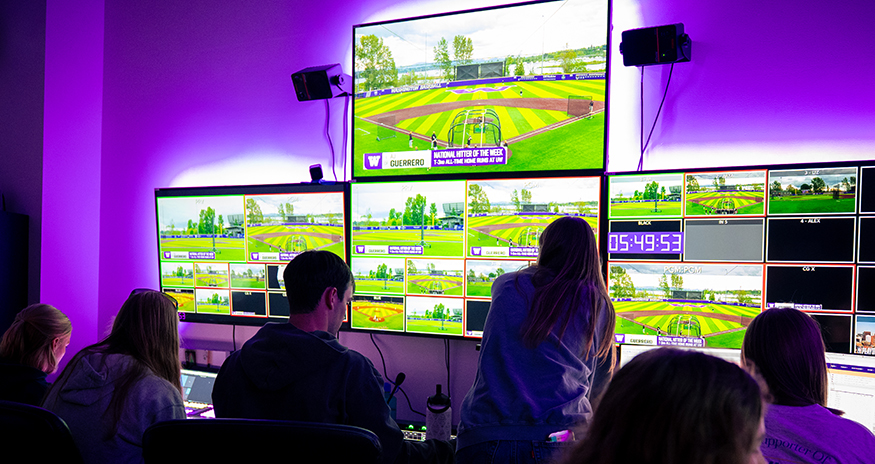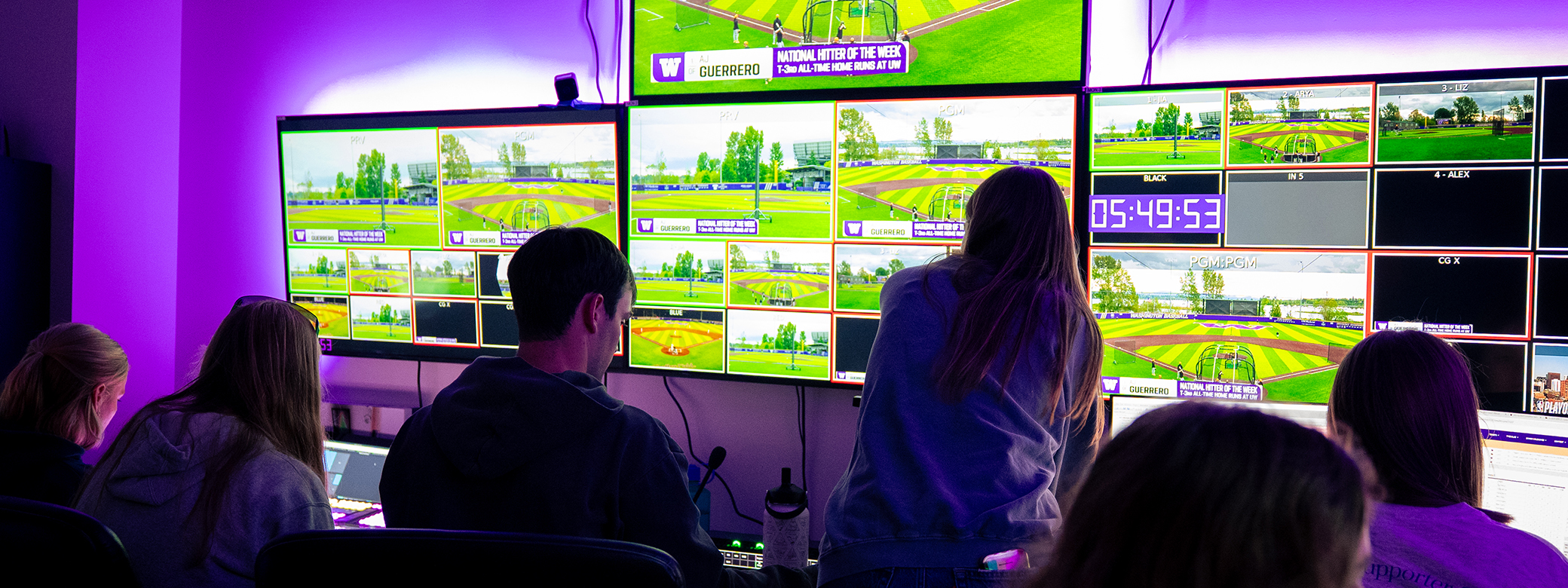
“And we’re live in 10, 9, 8…” I take a huge breath, drowning out my producer’s countdown as I attempt to expel any pre-show anxiety from my body. The live broadcast of a Husky women’s basketball game is about to begin, and I’m directing the show. “Have a good show, everybody!” I say into my headset, along with directions for our opening shots. The control room buzzes around me, the cogs in the machine clicking into place. The producer finishes their count, and the show is in my hands.
Sports broadcasting used to be a completely foreign world to me, and now it’s one of my favorite things to do. About a year ago, due to UW’s move to the Big Ten, the Big Ten Network’s StudentU program was introduced at the UW. The program is a paid internship in which all participants are responsible for broadcasting home games that aren’t picked up by TV. I have been lucky enough to be part of the first cohort of interns. Access to cameras and replay, audio, and graphics software allows us to put on complex shows that are streamed on Big Ten Plus, or B1G+.
A huge passion of mine has always been storytelling. Broadcasting has allowed me to do that in a whole new way. Every game has a story that is constantly shifting and developing.
In fall 2024, 37 UW students entered the program with a blank canvas, and with the help of our managers, Jay Divine and Sam Wojtalewicz of UW Athletics, we’ve become miniature professionals. We take on various roles for the sports broadcasts, from camera, replay, and graphics operators to producers and directors. For the first month or two, I felt super lost a lot of the time, but getting thrown into the deep end was an efficient way to learn how to swim. Over time, broadcasting started to become a language I was able to speak.
It’s my third year at the UW, and outside of StudentU, I am a double major in cinema & media studies and English (creative writing). A huge passion of mine has always been storytelling. Broadcasting has allowed me to do that in a whole new way. Every game has a story that is constantly shifting and developing. Our main job during the show is to pick up what storylines are forming in the game and adjust quickly to what is happening in real time. When we prepare before the show, we do our research to anticipate some of these things, but we can’t predict how the game will go. It’s what makes the shows so exciting.

I’ve always been a fan of sports and watched a lot of broadcasts growing up, but I never imagined that I’d be the one stepping behind the camera. A big thing we have to keep in mind during shows is our audience. What does the audience want to see, what do they care about, what do they not want to see? We are the eyes and ears for friends, family, or fans who are unable to be there. It matters that we show a replay when something big happens, or follow a player who is having a good or bad day.
Numerous times over these past months, I have been given the opportunity to lead the crew as the director, which was one of my main goals going into this internship. I wanted to learn everything, but the idea of leading the show and calling the shots intrigued me the most. It took a lot of observing and working other positions before I felt prepared to step into that role. The first day I did it, I was terrified. After it was over, the adrenaline of the show was a huge high, and I wanted to do it over and over again.

StudentU has fostered an incredibly tight community, because these broadcasts are not possible without a team. Our crew represents a lot of different majors, from cinema & media studies and journalism to political science and engineering. We were all strangers on that first day eight months ago, and now we’ve built a space where we can create and experiment, all while putting on great shows and having fun. It truly is such a unique experience.
A practice we learned from very early on is to never do anything alone. The only way for all of us to learn is to teach each other. We produce our best shows when we are all in sync, when everyone is talking and asking questions. The control room can be a stressful environment, where every mistake you make happens live, so practicing communication and understanding is the most important thing we do.
As we head into our final stretch of the collegiate sports season, we have begun to look towards what next year will be like. Some students will leave the program, but we’ll also gain new interns, who are hopefully ready to jump into this crazy world with us. I will be a senior, returning to StudentU for a final year. My goal is to be a mentor for new members of the crew and impart every bit of knowledge I’ve soaked up over the past year.

During the break between seasons, I’m going to miss broadcasting. It’s become something I look forward to, though it never fully fades from my life. Every now and then, I have dreams where I’m the one broadcasting the dream. My mind roams across stories through the lens of control room screens and camera angles. Even watching sports on TV looks a lot different now. I can’t watch a live broadcast without thinking about the chatter in their control room or the camera cuts the director is making.
All of this shows me how far I’ve come and how much I can still grow in this program. I don’t know if a career in broadcasting will be a part of my future, but I do know that this experience has shaped me into a reliable teammate and adaptable storyteller. I know I’ll carry everything I’ve learned at StudentU to wherever life takes me next. It’s a part of me now.
Audrey Spurgeon is a junior in the University of Washington College of Arts & Sciences, majoring in cinema & media studies and English.
More Stories

AI in the Classroom? For Faculty, It's Complicated
Three College of Arts & Sciences professors discuss the impact of AI on their teaching and on student learning. The consensus? It’s complicated.

What Students Really Think about AI
Arts & Sciences weigh in on their own use of AI and what they see as the benefits and drawbacks of AI use in undergraduate education more broadly.

A Love of Classics and Ballroom
Michael Seguin studied Classics at the UW and now owns Baltimore's Mobtown Ballroom. The two interests, he says, are more connected than they might seem.
